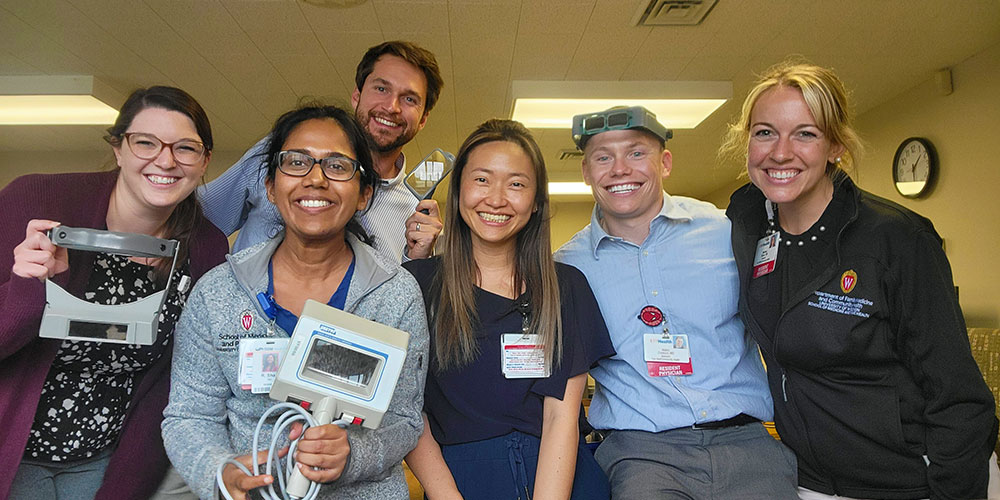
Our residency training is intentionally structured to provide a strong foundation in full-spectrum family medicine while allowing increasing flexibility and customization as residents progress through the program.
- R1 Year: The first year is designed to be an intensive, inpatient-focused experience with limited elective time. Residents build critical skills in adult medicine, obstetrics, pediatrics, emergency care, and surgery—laying the groundwork for future autonomy.
- R2 Year: The second year shifts to more outpatient care, leadership opportunities, and teaching experiences. Residents begin to supervise inpatient teams and participate in a rural rotation and community health work, with growing flexibility to tailor their education.
- R3 Year: The third year offers the most elective time, allowing residents to focus on individual interests and prepare for their future practice. Hospital rotations decrease, while outpatient and specialty-focused electives expand.
Throughout all three years, residents remain deeply engaged in their continuity clinics and benefit from structured teaching, protected didactic time, and a supportive learning environment that prioritizes wellness, community engagement, and a biopsychosocial approach to care.
Outpatient Rotations
During outpatient rotations (required and elective) residents are generally scheduled to see patients at their continuity clinic four half-days per week, attend an outpatient rotation five half-days per week, and attend one half-day of Family Medicine Seminars.
Required Outpatient Rotations
Residents complete the minimum requirements as outlined below:

Elective Outpatient Rotations
Residents have a minimum of 26 weeks of elective time. Established electives are listed below. Residents may also develop their own electives, and longitudinal electives can be arranged to meet individual educational goals.
• Addiction Medicine • Allergy • Behavioral Health • Cardiology • Clinical Skills teaching • Diabetes Management • Direct Primary Care • Endocrine • FQHC • Gender Care • High Risk OB • Hospice • Hospitalist • Integrative Health • Lactation • Migrant Mobile Health Clinic • Neurology • NICU / Neonatal Resuscitation • Nutrition • OMT for MDs • Ophthalmology • Out-of-town / International • Palliative Care and Hospice • Practice Styles • Procedures • Psychiatry • Pulmonology • Radiology • Research • Resident as Teacher • Urgent Care • Urology • Vasectomies • Weight Management • Wound Care •
Additional Educational Requirements
Additional educational requirements include the weekly Primary Care Conference or Journal Club, family medicine seminars with a broad curriculum, inclusive of the full spectrum of family medicine. There are also weekly resident led teaching sessions called Case-Based Conference and an EKG teaching series.
Other Curriculum
Behavioral Science Curriculum
The behavioral science curriculum has long been a strong foundation of our program. Our family physician, nurse practitioner, and physician assistant faculty actively integrate responsiveness to the emotional needs of patients and their families into their teaching and practices, including working closely with the behavioral science faculty located at each FMC. Behavioral health care and education are not relegated only to behavioral science faculty. Physician faculty recognize, value, practice, and teach the role of the biopsychosocial approach. Integrative health faculty provide expertise in mind-body-spirit wellness and the importance of a patient-guided approach to healing.
Community Health Curriculum
Our longitudinal community health rotation features programming designed to enhance understanding of how to practice community-based medicine and work with key community resources that are important to patients. During the first year, residents participate in creating partnerships with community agencies. Residents then individualize their experience in addressing health and wellness issues associated with their FMC’s patient population. During protected time in the second and third years, residents create a personal learning plan that may include design and implementation of a community health project with the assistance of the department’s Office of Community Health, FMC faculty, other residents, and community members.
The goals of the community health rotation include the following:
- To understand the community served by the FMC
- To familiarize residents with the local resources that address community health issues
- To integrate the use of local health and social resources into clinical care
- To learn the principles of community health care team management
- To understand the impact of socioeconomic conditions on the health and well being of patients
- To understand how public health policy at the local, state, and national levels interface with patient health
Parenting During Residency
“The faculty, staff and residents have all been very supportive and instrumental in making my experience as a new parent more comfortable. From being able to coordinate medical appointments, parental leave and nursing accommodations, I appreciate the support and flexibility while becoming a parent in residency. I am glad to be training in such a family-friendly environment that endorses diversity from multiple views including parenthood.” -Andrea Suarez, MD, 2021 Graduate
Pregnancy and parenthood are very common in our residency. Here are some ways we support our residents:
- Up to 8 weeks of paid parental leave: Residents can take more weeks as unpaid leave. Vacation can be used to increase leave without extending residency.
Parenting/infant development rotation: This is a 1 to 3-week elective that includes 4 half-days of self-study per week to work on a project related to parenting. - This elective can serve as a transition between parental leave and returning to clinical rotations.
- Breastfeeding: We support the wellness of lactating residents by understanding the additional challenges faced, and we provide accommodations for pumping mothers in our clinical and learning environments.
Resident Support
We care about the health and well-being of our residents. As such, we have many activities that are supported by the residency program, including:
- The famous mid-winter “Fizzle” Dinner, where first-year residents and their significant others mark the half-way point in the year with food and drink at a local Madison restaurant. Each intern is presented with a special award from the chief residents, and this event is always a fun time!
- Chief resident rounds bring residents together every other Wednesday before didactics to discuss pertinent issues and enjoy each other’s company.
- A yearly resident retreat takes place over a fall weekend at an outdoors-oriented site outside of Madison. Faculty cover patient care responsibilities during the retreat.
- Wellness-based group activities are scheduled regularly during protected didactic time, including Check-in groups, Resiliency Training and Balint Groups.
In addition, the program director and all faculty and residency staff are open and available to residents for any purpose. We truly care about our residents’ quality of life as well as promoting the best educational experience.
TEACH Cards
TEACH Cards (Teaching Evidence-based medicine And Clinical topics in the Hospital) are an inpatient educational tool created at the University of Wisconsin-Madison Family Medicine Residency Program in 2013.
